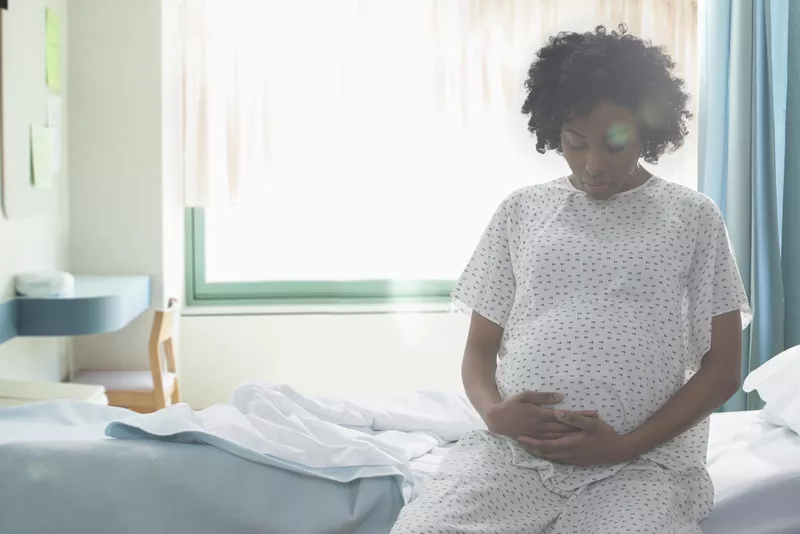Key Takeaways
- The Delta variant led to a surge in pregnant people being hospitalized with COVID-19. It is unclear how Omicron will affect hospitalization.
- Nearly all of these cases were unvaccinated.
- Getting vaccinated while pregnant is recommended to protect both you and your baby.
COVID-19 can be especially dangerous to those who have preexisting conditions, like cancer, chronic diseases, heart conditions, or more. This list includes pregnancy, which causes changes in the body that make you more likely to get severely ill from respiratory diseases, like COVID-19.
In fact, research has found that increasing numbers of people have been hospitalized with COVID-19 while pregnant.
It appears that the vast majority of these cases are due to the Delta variant. Further, researchers found that almost all of the COVID-19-positive pregnant people who needed hospitalization were not vaccinated.
“Being pregnant and not vaccinated puts a woman at greater risk for severe disease and hospitalization,” says Katherine Wolfe, MD, a maternal-fetal specialist, and director of the Diabetes and Pregnancy Program at Akron Children’s Hospital in Ohio. “The vaccination rate is low among pregnant women, despite recommendations to get vaccinated from the Centers for Disease Prevention and Control, Society for Maternal-Fetal Medicine, and American College of Obstetricians and Gynecologists.”
Being pregnant and not vaccinated puts a woman at greater risk for severe disease and hospitalization. The vaccination rate is low among pregnant women, despite recommendations to get vaccinated.
— KATHERINE WOLFE, MD
Why You Should Get Vaccinated While Pregnant
Anything you put into your body while pregnant has the potential to pass to your fetus. Particularly since the mRNA vaccines are new, it’s understandable to be concerned about taking them during pregnancy. Some people are opting to delay vaccination if they are pregnant.
Current data suggests that the benefits of getting a COVID-19 vaccine while pregnant outweigh the risks. Pregnancy increases the risk of suffering severe complications from COVID-19.2 “Pregnant women are more likely to be admitted to the intensive care unit and die from COVID-19 when compared to non-pregnant people,” says Dr. Wolfe.
Pregnant women are more likely to be admitted to the intensive care unit and die from COVID-19 when compared to non-pregnant people.
— KATHERINE WOLFE, MD
Experiencing a high fever while pregnant also puts your baby at risk, so it’s important to protect yourself against any illness associated with fever.
Vaccination does not necessarily prevent you from getting COVID-19, but it can reduce the chances you catch it. It can also prevent you from becoming seriously ill. This keeps both you and a baby on the way safest. “Maternal antibodies are transferred to the fetus, and may be beneficial in protecting the newborn from COVID disease,” notes Dr. Wolfe.
“Vaccination has shown a marked reduction in severe disease as well as death,” notes Robert Atlas, MD, Chair of The Department of Obstetrics and Gynecology at Mercy Medical Center in Baltimore, MD.
COVID-19 Vaccine Misconceptions
Many people with a baby on the way have concerns about getting vaccinated while pregnant. There are rumors swirling, and it’s only natural that new parents may be worried about how the vaccine will affect their unborn child.
Some worry that the vaccine may increase the risk of miscarriage. There are also concerns about how the vaccine might affect the baby’s development or their future fertility. In fact, there is very little risk of the vaccine having a negative effect on a fetus.
Since pregnant people are at a higher risk of complications if infected, getting the shot helps keep both parent and baby safe. There is another benefit for babies as well. Babies whose birth parents were vaccinated while they were in utero may be born with antibodies protecting them against the COVID-19 virus while they are still too young to get the vaccine themselves.
Protecting Yourself from COVID-19 During Pregnancy
To stay healthy while pregnant, you should also continue to practice all of the standard COVID-19 protocols. “The best thing to do [along with getting vaccinated] is to continue to wear a mask, social distance, avoid crowds and indoor gatherings,” says Dr. Atlas.
As we continue to work towards reopening, being pregnant may affect your comfort level. Take it slowly, and only proceed with what you are comfortable with. If working at home is an option for you, you may want to put off going back into the office for now. You may choose to skip large gatherings or only attend if they are outdoors and everyone is wearing masks.
Ultimately, getting vaccinated puts you in a position where you are far less likely to experience severe side effects if you do get infected. Then you can decide what additional precautions you feel most comfortable with taking.
What This Means For You
Getting sick with COVID-19 while pregnant may have serious consequences to both you and your baby. As new variants develop, the chances of being severely ill from this virus grow. The good news is that getting vaccinated while pregnant will protect you and your child, making infection less likely as well as severe symptoms. Additionally, your baby will likely be born with antibodies, protecting them at an age too young to get vaccinated.9


